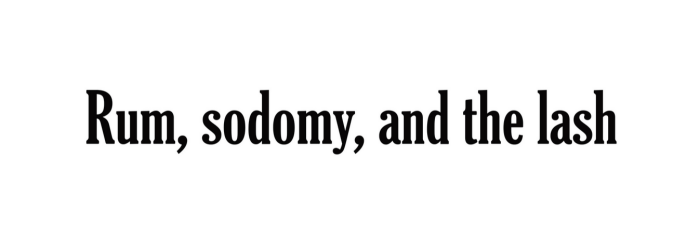Rum, sodomy, and the lash| group show: Catharine Ahearn, Contemporary Art Writing Daily, Tony Conrad, Karl Andersson, Morag Keil, Bjarne Melgaard, Steve Reinke, Stephen G. Rhodes, Simon Thompson, Peter Wächtler
Organised by Ed Atkins and James Richards
Opening: Saturday 17.10.2015, 6- 9 pm
20.10.2015 — 16.0.2016
Eden Eden, Bülowstraße 74, 10783 Berlin
Opening: Saturday 17.10.2015, 6- 9 pm
20.10.2015 — 16.0.2016
Eden Eden, Bülowstraße 74, 10783 Berlin
Rum, Sodomy, and the lash cites a trail of accrued quotes, beginning with Churchill’s sardonic (and more than likely misattributed) comment on the Royal Navy: “Don’t talk to me about naval tradition. It’s nothing but rum, sodomy, and the lash.” In 1985 it became the title of The Pogues second album because, according to drummer Andrew Ranken, it pretty bluntly summed up what being in the band entailed. The similarities between the two — the Royal Navy and a punk band — are consistent in both their circumstance and their subsistence: isolated communities of vital practical, emotional, and sexual co-dependence. Similarly, both communities are also parodies — more or less camp in their performance of the rules of the establishment. They are pragmatically, necessarily transgressive — and also intensely romantic in their promise and their aspiration. Both solicit to the fantasies of young men — both offer states of exception that not only afford transgression, but also actively adjure it. Hans Turley’s 1999 book, Rum, sodomy, and the lash: piracy, sexuality and masculine identity, discusses those ostracised, even, from the Navy: Pirates. Those sailors who never wanted to come back to traditional society, had given themselves over to a life of liberal deviancy, of re-describing their identities set adrift from a punitive and lopsided law. Never returning to society means the founding of another, defined antagonistically, parodically, fantastically, in relation to its parent. The primary object of piracy’s antagonism (property) is determined by the common law of the prevailing society, its image of society’s defining tenets. In Rum, Sodomy, and the lash, legality is practical recourse to order and the chastening of deviance as much as it is the dangerous retarding of desire. The moral imperative is retentive; pirates, punks, adolescents, queers, sub- and counter-cultural proponents relax the œconomy of the state.
The exhibition title’s enigmatic maxim is carried through the murk of deviation within and apart from the strictest limits of society (the military, education, the making of a prime minister) — it is also society’s burlesque, its punk
Rum, sodomy, and the lash | Eden Eden | 17.10.205

